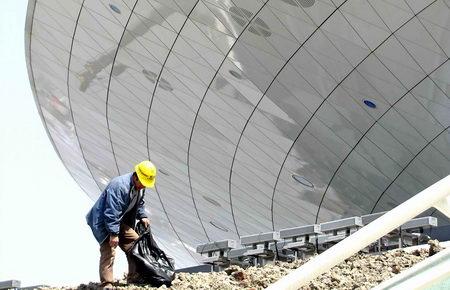Pre-fabricated construction aims to cut consumption
BEIJING: Pre-fabricated apartments with a total floor space of 500,000 sq m will be built in Beijing this year, a move to reduce energy consumed in the building process.

A worker picks up garbage near a construction project in Shanghai. Industry statistics show that decorating a building produces a large amount of garbage, with half of it being non-biodegradable. Construction waste could be cut by 80 percent if modern industrial methods and technology are adopted, experts say. [CFP]
According to Sui Zhenjiang, head of the Beijing Municipal Construction Committee, this year is the second in the city's three-year pilot program to develop the construction of pre-fabricated housing.
Next year will see the construction of one million sq m of housing under the program. Moreover, all these apartments will already be decorated when their new owners move in.
Industry statistics show that decorating a 90 square meter apartment produces two tons of waste, with half of this being non-biodegradable. But uniform decoration by property developers could cut this waste by more than half.
The benefits of building pre-fabricated homes are similar. According to calculations by Vanke, the country's largest property developer, the construction of a 19-story building needs 24 months in the traditional way, but the time could be shortened to 20 months with pre-fabricated construction. And it could save 60 percent of water usage and reduce construction waste by 80 percent.
Energy consumption
Han Qide, vice-chairman of the Standing Committee of the National People's Congress, said at a recent forum that energy consumed during construction accounts for 28 percent of total national energy consumption. As China is still at the initial stage of urbanization, construction is an important field in which to save energy.
"We plan to produce 1 million sq m of pre-fabricated residential apartments this year, among which one-fifth will be constructed in Beijing," said Mao Daqing, vice-president of China Vanke Co Ltd.
In fact, selling only pre-fabricated, pre-decorated and environmentally friendly homes is Vanke's strategic focus for 2010, said Mao.
"Pre-fabricated housing is definitely a priority for us, but our efforts in this area are still at the design and testing stage," said Yu Ying, deputy general manager of Poly Real Estate, the country's second largest property developer.
However, high cost is the major challenge for proponents of pre-fabricated housing at the trial stage. For instance, the materials used in this method are more expensive than those used in traditional construction.
According to statistics, the cost of pre-fabricated housing is 350 yuan to 500 yuan per sq m higher than the traditional way.
"Once its reaches a certain scale, pre-fabricated housing will help us cut costs and provide better products," said Mao.
Meanwhile, Vanke is trying to save energy in other ways. For instance, the company started replacing regular dustbins with classified garbage cans in all its communities last month.
For Yu, to accelerate the pace of building pre-fabricated housing, the government needs to issue some favorable policies to encourage property developers to use new techniques and materials.
Sui said if property developers apply for pre-fabricated construction, up to 3 percent of the floor space of the project will be provided to them free of charge.





